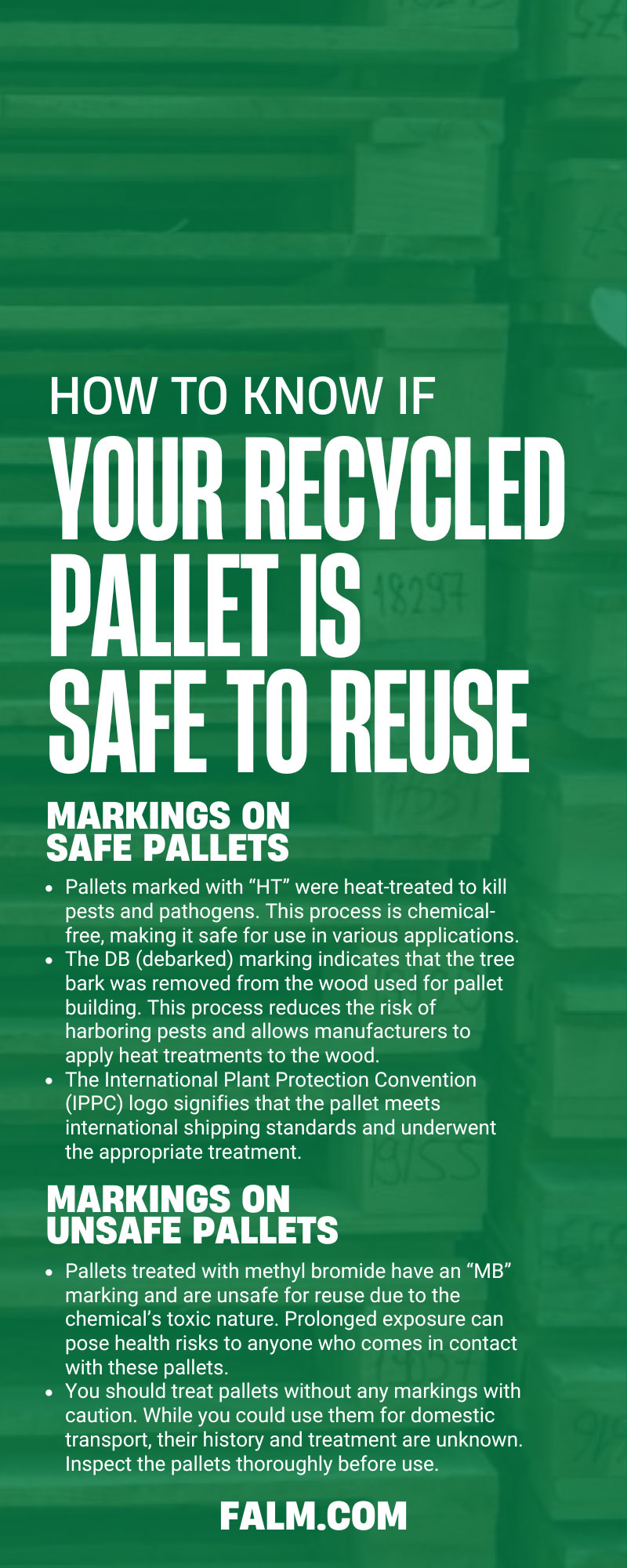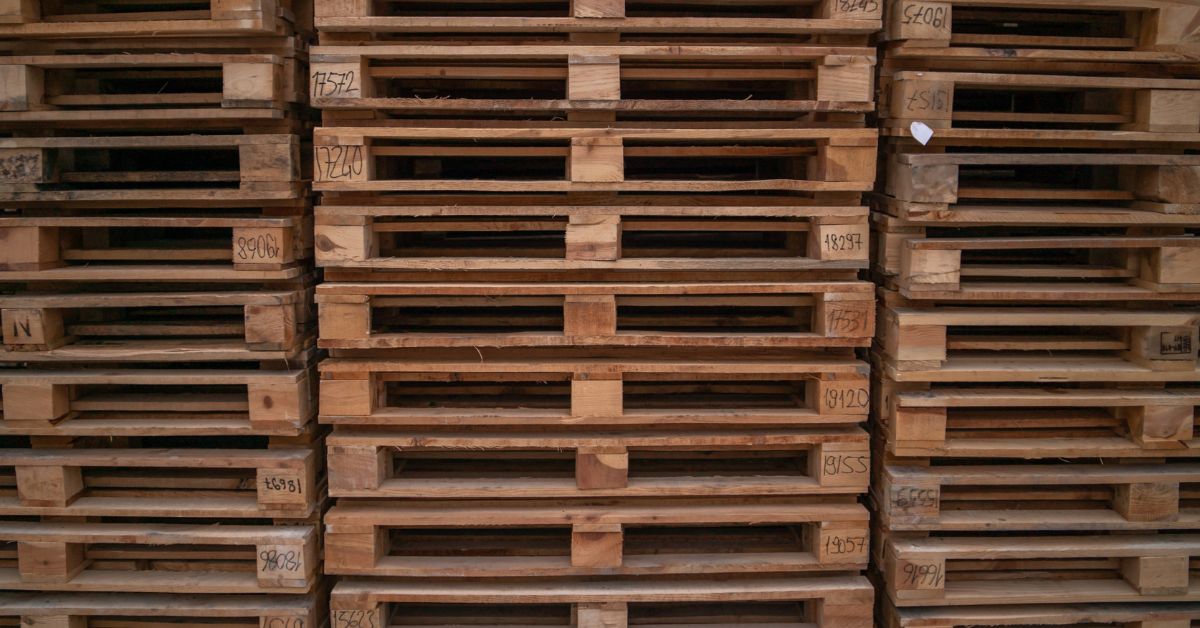Recycled pallets are versatile and eco-friendly solutions for business owners looking to save money and contribute to sustainability efforts. However, not all recycled pallets are useful in the same way.
Knowing if your recycled pallet is safe to reuse is essential for preserving the safety and efficiency of your operations. Keep reading to discover the popular uses for recycled pallets, the benefits of using secondhand pallets, and how to identify safe pallets for your business.
Popular Uses for Recycled Pallets
Recycled pallets have a second life in many industries. Here are some popular ways that companies repurpose these versatile items.
- By combining pallets with other recyclable elements, construction companies can create sustainable building materials while reducing construction waste and budgeting concerns.
- Many industries need wood for manufacturing purposes. For example, paper manufacturers can turn pallet wood into pulp to make paper products.
- Warehouse teams and auto shop workers use recycled pallets to build shelving units and storage racks, maximizing space and organization.
- Business owners and event planners use pallets to create cost-effective displays and booths that are easy to assemble.
Benefits of Using Secondhand Pallets
Secondhand pallets offer many benefits that can improve a company’s supply chain and bottom line. Let’s delve into these advantages:
Cost Savings Over Time
One of the most significant benefits of purchasing used wooden pallets is the cost savings. New pallets are quite expensive, especially when you need them delivered as quickly as possible.
Recycled pallets are significantly cheaper, allowing business leaders to re-allocate resources. These savings add up over time, making secondhand pallets a financially savvy choice.
Steady Supply of Pallets
The supply chain for used wooden pallets is reliable. Many businesses that receive goods on pallets sell them back into the market once they’re done with them. This constant circulation provides a steady supply of recycled pallets, so you don’t have to worry about running out!
Improved Sustainability
By reusing pallets, you contribute to a more sustainable environment. Every recycled pallet means pallet manufacturers have one less pallet to create, reducing the demand for timber and the carbon footprint associated with pallet production. This eco-friendly practice conserves natural resources and reduces waste.
Determining Whether a Recycled Pallet Is Safe for Reuse
Determining the safety of a recycled pallet involves a few critical steps. Here’s what you should look for when assessing a recycled pallet’s reusability.
Markings on Safe Pallets
Safe pallets typically have clear markings that indicate they’ve been treated in compliance with safety standards. Look for the following:
- Pallets marked with “HT” were heat-treated to kill pests and pathogens. This process is chemical-free, making it safe for use in various applications.
- The DB (debarked) marking indicates that the tree bark was removed from the wood used for pallet building. This process reduces the risk of harboring pests and allows manufacturers to apply heat treatments to the wood.
- The International Plant Protection Convention (IPPC) logo signifies that the pallet meets international shipping standards and underwent the appropriate treatment.
Markings on Unsafe Pallets
While examining pallets, you may come across some that are unsafe for reuse. Avoid pallets with the following markings:
- Pallets treated with methyl bromide have an “MB” marking and are unsafe for reuse due to the chemical’s toxic nature. Prolonged exposure can pose health risks to anyone who comes in contact with these pallets.
- You should treat pallets without any markings with caution. While you could use them for domestic transport, their history and treatment are unknown. Inspect the pallets thoroughly before use.
Are National Pallets Safe for Reuse?
National pallets, which have use within a single country, might not adhere to the same standards as international pallets. While some national pallets are safe for reuse, inspect them for markings and general condition first.
Do You See Mysterious Stains or Spills?
A visual inspection is a critical step in determining pallet safety. Check for stains, spills, or discoloration. Unidentified substances on a pallet are potentially hazardous and could leave you exposed to chemicals or other harmful materials. If you spot suspicious marks on a pallet, it’s best to avoid using it.
Additional Pallet Codes You Should Know
Several other codes can provide insights into the safety and treatment of recycled pallets:
- KD (kiln dried) indicates that the pallet was dried in a kiln, reducing its moisture content and making it unlikely to harbor mold or pests.
- The European Pallet Association e.V. (EPAL) logo ensures that the pallet meets stringent European standards for safety and quality.
- The ISPM 15 code signifies that the pallet complies with the International Standards for Phytosanitary Measures No. 15, meaning it received treatment to prevent the spread of pests.
What Is an A-Grade Recycled Pallet?
An A-grade recycled pallet is a high-quality pallet that was previously in use but remains in excellent condition. It offers the best balance between cost savings and reliability, making it a preferred choice for many business leaders. These pallets typically have the following characteristics:
- Have minimal repairs or replacements.
- Exhibit consistent size and shape.
- Show no significant signs of damage or wear.
- Suit applications where aesthetics and performance matter.
What Makes a Recycled Pallet Receive a B-Grade?
B-grade recycled pallets are still functional but may show more signs of wear and require some repairs. Characteristics of B-grade pallets include the following:
- Visible repairs or replacements.
- Slight variations in size and shape.
- Suitable for applications where appearance matters less, but functionality is necessary.
While B-grade pallets are more affordable, they may not suit the standards of your industry or customers’ guidelines. You should fully understand your pallet needs before placing any orders.
Purchase Safe Recycled Pallets From First Alliance Logistics Management
When you’re sourcing safe and reliable used wooden pallets, First Alliance Logistics Management is a trusted provider. Our pallets meet stringent safety and quality standards, providing customers with peace of mind that they’re getting great products. Whether you need A-grade or B-grade pallets, you can count on us for a steady supply!
Knowing if your recycled pallet is safe to reuse is essential for any business owner looking to maximize cost savings and sustainability. By understanding the markings and conditions of recycled wooden pallets, you can make informed decisions and support the safety of your operations.
Always source your pallets from reputable suppliers like First Alliance Logistics Management to guarantee quality and reliability. Visit our website for more information about our recycled pallet program.


